August Newsletter
Issue 25
I. CREATE News and Updates
- 2025 Summer Civic Learning Academy
- East Washington Academy Students Explore Conner Prairie
- Teacher Spotlight: Clarence Alexander
- MCS Brings Kennedy and King’s Legacy to the Classroom
- Civic Growth Across Muncie Community Schools
II. Opportunities for Teachers and Students
- CREATE’s Civic Badge Program
- 2025 Conference on Civic Studies and Democracy
IV. Featured Resources
- Apply to the iCivics Leadership Academy!
- We the People Summer Institute – Free Professional Development for Civics Teachers
CREATE News and Updates
2025 Summer Civic Learning Academy
From June 16–20, 2025, the Center for Economic and Civic Learning (CECL) at Ball State, hosted the annual Summer Civic Learning Academy (SCLA). The week-long professional development experience brought together educators from across Muncie and Indiana to explore new ways of embedding civic 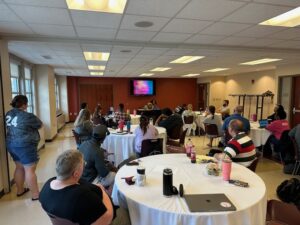 engagement, local history, media literacy, and student voice into the classroom. Held at Ball State’s L.A. Pittenger Student Center, the Academy featured in-person sessions, fieldwork in Indianapolis, and a culminating day of collaborative curriculum planning. More than a training, the SCLA served as a movement toward reimagining civic education at a time when national scores in civics and U.S. history remain alarmingly low.
engagement, local history, media literacy, and student voice into the classroom. Held at Ball State’s L.A. Pittenger Student Center, the Academy featured in-person sessions, fieldwork in Indianapolis, and a culminating day of collaborative curriculum planning. More than a training, the SCLA served as a movement toward reimagining civic education at a time when national scores in civics and U.S. history remain alarmingly low.
Grounding Local Civics and History
The Academy began with a session led by Shelby Lashbrook, State Director of Civic Engagement for the Indiana Alliance of YMCAs. Lashbrook introduced teachers to the Indiana YMCA Youth & Government (INYaG) program, a statewide 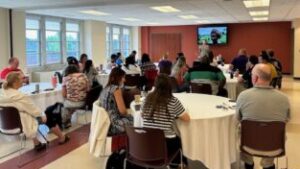 initiative that immerses students in roles as legislators, attorneys, justices, and journalists.
initiative that immerses students in roles as legislators, attorneys, justices, and journalists.
Educators also heard directly from student participants who described the life-changing impact of Youth & Government. One student shared, “Debating my own bill on the Statehouse floor gave me confidence I never thought I had.” This year, the Muncie YMCA will launch its own Youth & Government delegation, giving Delaware County students a new pathway into civic leadership.
In the afternoon, Melissa Gentry and Lorey Stinton (Ball State University Libraries) led “A Map of Protests and Politics in Muncie History,” which used ArcGIS Story Maps to bring local history alive. Participants explored sites such as the Delaware County Courthouse, the Post-Democrat Office (where Mayor George Dale opposed the Klan in the 1920s), and the Muncie Opera House, where Susan B. Anthony spoke to more than 1,000 residents in 1887.
The day closed with Karen Vincent, Executive Director of the Delaware County Historical Society, who highlighted the civic activism of Muncie women in the 1970s Equal Rights Amendment debate—stories brought to life with letters, oral histories, and media archives.
Tuesday’s sessions highlighted the role of law, justice, and authority in civic life. Tim Kalgreen of the Indiana Bar Foundation introduced teachers to the We The People: The Citizen and the Constitution program, a nationally recognized model for teaching constitutional literacy through simulated hearings. Educators also explored mock trial simulations that sharpen students’ critical thinking and communication skills.
In the afternoon, Officer Arin Phillips of the Muncie Police Department led “Beyond the Badge,” an interactive session on community policing and the role of law enforcement as civic actors. Teachers worked through scenarios that illustrated how trust and belonging intersect with civic identity.
Civic Fieldwork in Indianapolis
Wednesday took participants to Indianapolis for immersive civic fieldwork. At the Indiana Historical Society, teachers explored “You Are There” exhibits and learned how the National History Day in Indiana  program equips students to conduct original research. Later, at the Benjamin Harrison Presidential Site, educators connected presidential history to contemporary issues of civic leadership. A highlight was the site’s Future Presidents of America program, which models how youth leadership experiences can cultivate responsibility and communication.
program equips students to conduct original research. Later, at the Benjamin Harrison Presidential Site, educators connected presidential history to contemporary issues of civic leadership. A highlight was the site’s Future Presidents of America program, which models how youth leadership experiences can cultivate responsibility and communication.
Innovative tools included:
- Hexagonal Thinking Maps for teaching constitutional concepts.
- Civic Clue, a classroom-ready game using Muncie landmarks.
- Women’s History Timelines linking local figures like Frances Wilson Grayson to national milestones.
The final day focused on digital citizenship and civic voice. Kate Elliott (Ball State School of Journalism) led Truth Detectives,  training teachers to help students spot misinformation using fact-checking games, bias charts, and simulated disinformation campaigns. Later, Anne Fuchs (Court of Appeals of Indiana) presented Civility, Civics, and Communication, connecting vocal presence and civil discourse to classroom leadership. Teachers participated in speaking drills and exercises from her workshop “The Seven Secrets of Opera Singers,” linking performance skills to civic dialogue. The Academy concluded with a session by Dr. Michael T. Ndemanu (Ball State Educational Studies), who guided teachers through voting simulations as microcosms of democratic practice. His message: “Civic learning must not only inform—it must empower students to act as citizens.”
training teachers to help students spot misinformation using fact-checking games, bias charts, and simulated disinformation campaigns. Later, Anne Fuchs (Court of Appeals of Indiana) presented Civility, Civics, and Communication, connecting vocal presence and civil discourse to classroom leadership. Teachers participated in speaking drills and exercises from her workshop “The Seven Secrets of Opera Singers,” linking performance skills to civic dialogue. The Academy concluded with a session by Dr. Michael T. Ndemanu (Ball State Educational Studies), who guided teachers through voting simulations as microcosms of democratic practice. His message: “Civic learning must not only inform—it must empower students to act as citizens.”
Impact and Teacher Feedback

Post-program evaluations showed significant gains in civic knowledge, confidence, and instructional capacity. Teachers reported higher confidence in connecting civics to literacy, reaching underserved students, and using field trips as civic learning tools. One participant wrote: “This training has helped me see civics not just as content, but as a practice that belongs in every classroom.” Another added: “As an ELL teacher, I now feel ready to embed the Constitution and rights into student-centered lessons.”
The 2025 Summer Civic Learning Academy demonstrated how schools and communities can collaborate to confront the challenge of civic education with creativity and hope.
Read More HERE
East Washington Academy Students Explore Conner Prairie
This past spring, nearly 100 third graders from East Washington Academy (EWA) traveled to Conner Prairie for a day of hands-on learning, made possible through funding from the CREATE project. For many students, it was their first time visiting the nationally recognized living history museum—and it was an experience they will not soon forget.
Bringing History to Life
On May 21, 2025, EWA students, along with their teachers and parent chaperones, boarded buses for Fishers, Indiana, where they spent the day immersed in Indiana’s past. CREATE helped with transportation, admission, and planning special programs, including Conner Prairie’s popular Animal Encounters.
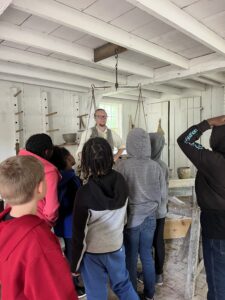 Throughout the day, students engaged with Conner Prairie’s costumed interpreters, explored reconstructed 19th-century homes and villages, and experienced Native American lifeways along the White River. They also enjoyed the hands-on play spaces and canoe activities, which connected directly to what they had been studying in the classroom.
Throughout the day, students engaged with Conner Prairie’s costumed interpreters, explored reconstructed 19th-century homes and villages, and experienced Native American lifeways along the White River. They also enjoyed the hands-on play spaces and canoe activities, which connected directly to what they had been studying in the classroom.
As one student shared: “This trip was awesome and we saw so many different things we learned about in class.” Others were quick to mention their favorite moments: “The baby animals were my favorite part!!” “I loved seeing the different parts and getting to play on the stuff!” & “The canoes and Native American part was really interesting.”
For EWA teacher Courtney Williams, the trip reinforced the power of experiential learning: “The kids had a blast and loved it so much! This was an opportunity for them to see and do things they’d only read about. It connected classroom lessons to real-world experiences, which is exactly what we strive for in our teaching.” The numbers reflect the scale of the effort. A total of 80 students, 15 parent chaperones, and 5 teachers participated, with CREATE support ensuring that cost was never a barrier.
Conner Prairie is one of the country’s most innovative history parks, designed to engage young learners in discovery, empathy, and civic imagination. For students at East Washington Academy, the trip built a sense of connection not only to Indiana’s past but also to their role as community members today. By experiencing history firsthand—whether holding baby animals, paddling a canoe, or asking questions of a costumed interpreter—students were able to practice the habits of curiosity, observation, and reflection that are essential to both civic learning and lifelong engagement.
Teacher Spotlight: Clarence Alexander
Clarence Alexander is more than just a Social Studies Teacher at Southside Middle School, he is 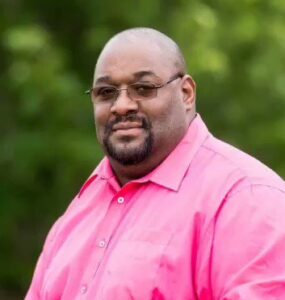 a mentor, leader, pastor, and coach who embodies the spirit of service. His commitment to students and the broader community was recently recognized in 2025 with Community Service Award, a distinction that reflects his dedication to making a lasting difference both inside and outside the classroom.
a mentor, leader, pastor, and coach who embodies the spirit of service. His commitment to students and the broader community was recently recognized in 2025 with Community Service Award, a distinction that reflects his dedication to making a lasting difference both inside and outside the classroom.
Why Teaching Matters
For Clarence, the decision to teach came from the heart. “I became a teacher because I wanted to be a positive role model—someone who actually cares and wants the best for the students,” he shares. Though he humbly admits that he may not be “the best teacher,” his focus on compassion and care for his students defines his approach. “There is no one who is going to have a more caring and compassionate heart for the students.”
This past summer, Clarence participated in the Summer Civic Learning Academy (SCLA). He describes the experience as “eye-opening,” noting that the lessons, resources, and networking opportunities will have a direct impact on his classroom. “The things that I learned, I will definitely pass on to the students so that they will be able to get the knowledge that we got.” Clarence encourages other teachers to look locally when it comes to strengthening civic education. “If any teachers want to learn about civics, they should definitely explore the local resources and also any organizations that can help increase their knowledge of civics, especially in this area.” For him, civic education is not a separate task but an integrated mission that ties students to their history, community, and responsibilities as citizens.
A Multifaceted Role in the Community
Clarence’s impact extends far beyond the classroom. In addition to teaching social studies at Southside Middle School, he also serves as a coach and as a 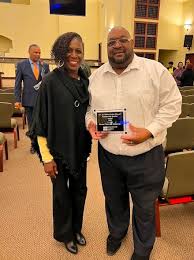 pastor at a local church. These roles, he believes, reinforce one another—shaping his mission to prepare young people with knowledge of the past and the civic awareness needed to help shape the future. “It is my mission to make sure our students have all the knowledge that they can get when it comes to their past and the things that have shaped our country.”
pastor at a local church. These roles, he believes, reinforce one another—shaping his mission to prepare young people with knowledge of the past and the civic awareness needed to help shape the future. “It is my mission to make sure our students have all the knowledge that they can get when it comes to their past and the things that have shaped our country.”
Through teaching, coaching, ministry, and civic service, Clarence Alexander demonstrates what it means to live out the values of compassion, responsibility, and leadership. His recognition with the MLK Community Service Award reflects not only his professional dedication but also his unwavering commitment to the well-being of his students and the strength of his community. Clarence’s story is a reminder of the transformative role teachers can play—not only in classrooms, but in the broader civic life of their schools and neighborhoods.
MCS Brings Kennedy and King’s Legacy to the Classroom
As the nation prepares for the 250th anniversary of American independence in 2026, the Center for Economic and Civic Learning (CECL) at Ball State has launched With Compassion Toward One Another: Preparing for the Challenge of Civic Unity Through the Legacy of Kennedy and King. This professional learning 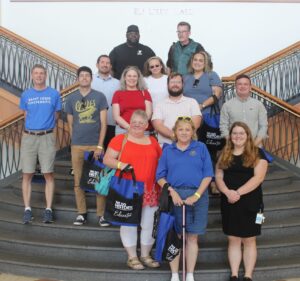 initiative—funded by the Library of Congress through its Teaching with Primary Sources (TPS) program—equips teachers to help students engage with some of the most powerful civic lessons in American history.
initiative—funded by the Library of Congress through its Teaching with Primary Sources (TPS) program—equips teachers to help students engage with some of the most powerful civic lessons in American history.
Among the first participants were several MCS a social studies teachers, who took part in the three-day Summer Institute held at Ball State on July 28–30, 2025.
“This program gave me the tools and confidence to bring primary sources alive for my students,” one teacher shared. “We looked at Robert F. Kennedy’s speech at Ball State just hours before Dr. King’s assassination, then studied his extemporaneous eulogy that night in Indianapolis. It was 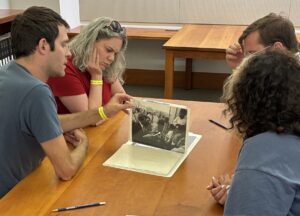 powerful to see how compassion and moral leadership can reshape a community in crisis.” The Summer Institute immersed teachers in civic memory, inquiry-based instruction, and service-learning design. Participants engaged with Kennedy’s speeches, King’s Letter from Birmingham Jail, and civil rights-era documents from the Library of Congress and Indiana Historical Society. Highlights included a screening and discussion of A Ripple of Hope, hands-on workshops using the TPS Inquiry Design Model, and collaborative lesson planning sessions.
powerful to see how compassion and moral leadership can reshape a community in crisis.” The Summer Institute immersed teachers in civic memory, inquiry-based instruction, and service-learning design. Participants engaged with Kennedy’s speeches, King’s Letter from Birmingham Jail, and civil rights-era documents from the Library of Congress and Indiana Historical Society. Highlights included a screening and discussion of A Ripple of Hope, hands-on workshops using the TPS Inquiry Design Model, and collaborative lesson planning sessions.
This fall, teachers will pilot a new unit at MCS that asks students to consider how civic leaders respond to moments of national tragedy and division. The lessons will culminate in student reflections for MLK Day and 9/11 Days of Service, connecting the legacies of King and Kennedy to today’s challenges of polarization and civic engagement. “This project brings together some of the most powerful lessons in American history,” said David Roof, Director of CECL. “We are proud to see teachers from Muncie and beyond take these lessons into their classrooms, helping young people see that compassion, dialogue, and courage are central to our democracy.”
Civic Growth Across Muncie Community Schools
CREATE is celebrating progress in civic education this spring, as new data from Spring 2025 assessments show significant gains in both civic content knowledge and student dispositions across all grade bands.

Annual Civic Learning Symposium, Teachers College, Student Center, CREATE
According to the latest evaluation, elementary students led the way, with average civic content scores jumping from 64% at baseline to 75%—an 11-point gain that surpassed project benchmarks. Middle and high school students also demonstrated impressive improvement. Middle schoolers increased by 6 points, reaching 72%, while high school students climbed from 62% to 70%, an 8-point rise.
These findings reflect a consistent upward trend across the board and affirm the value of CREATE’s professional development, curriculum integration, and student-facing civic learning opportunities.
“These numbers are more than statistics—they show that our students are thinking critically about democracy and their role in it,” said David Roof, Principal Investigator of CREATE.
CREATE’s civic content assessments, aligned with the National Assessment of Educational Progress (NAEP) and with Indiana Academic Standards, measure understanding in areas such as democratic principles, constitutional knowledge, and government functions. The 2025 results represent the culmination of focused instructional support, inquiry-based teaching, and classroom activities that bring civics to life.
In addition to content knowledge, students also showed growth in civic dispositions—the attitudes and values that support democratic participation. Based on a multi-year tracking study from 2023 to 2025, disposition scores among middle and high school students steadily rose from a baseline average of 2.95 to 3.06 by Spring 2025 on a 4-point scale. These gains, while more modest, are significant and point to increasing civic confidence, agency, and engagement.
Data highlights from 2025 include
- Elementary students: Median civic knowledge rose from 39% to 78%.
- Grade 8 students: Median scores reached 83%, the highest across all levels.
- 85% of high school students agreed they could make a difference in their community.
- 80% said they planned to register to vote when eligible.
These results demonstrate MCS teacher’s impact—not only equipping students with civic knowledge but also nurturing the mindset to use it. With 249 teacher PD engagements this year alone and over 7,000 professional development hours logged since the project’s inception, the civic learning ecosystem across Muncie Community Schools continues to thrive.
As CREATE enters its final month, these gains point toward a strong legacy, one grounded in equitable access to civic education and a renewed culture of engagement for students, educators, and the wider community.
II.Opportunities for Teachers and Students
2025 Conference on Civic Studies and Democracy
September 25–27, 2025
The Center for Economic and Civic Learning (CECL) is excited to host the 2025 Conference on Civic Studies and Democracy, an expanded event dedicated to the theme Character, Aesthetics, and Community. This three-day  gathering will highlight how civic education, artistic expression, and moral formation come together to strengthen democracy and community life.
gathering will highlight how civic education, artistic expression, and moral formation come together to strengthen democracy and community life.
A Special Invitation to MCS Teachers
This year’s conference has been designed with Muncie Community School educators in mind. We know your time is valuable, so we’ve created a schedule that allows you to participate in Thursday evening’s opening reception and keynote and Saturday’s closing sessions and dialogues—and to be recognized for your professional growth.
MCS teachers who attend both days will receive a $400 stipend.
This is more than just another conference, it’s a chance to recharge, connect with colleagues, and develop new strategies for strengthening civic learning in your classroom.
Conference Highlights
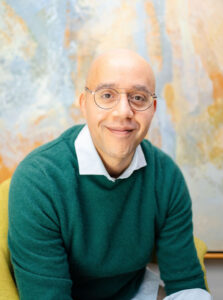
- Opening Reception & Keynote (Thursday, September 25)
- Hear from Michael Greer, President & CEO of ArtsFund, during the prestigious Fred Meyer Lecture in Cultural Policy and Arts Advocacy.
- Interactive Sessions & Community Dialogues (Saturday, September 27)
Join final workshops and action-focused conversations designed to equip educators with concrete strategies for building civic identity in their students.
Muncie Central Student Art Exhibition
Celebrate the creativity of Art students from Muncie Central, whose work will be showcased throughout the event.
Don’t Miss Out – Register Today!
IV.Featured Resources
Apply to the iCivics Leadership Academy!
We’re excited to share a new opportunity for Indiana educators: iCivics is 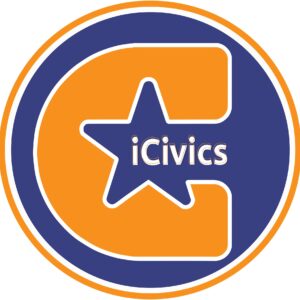 launching a Civics Leadership Academy right here in our state one of only two in the nation (alongside New Hampshire).
launching a Civics Leadership Academy right here in our state one of only two in the nation (alongside New Hampshire).
This highly selective program will bring together a cohort of 35 dedicated educators to strengthen their skills as civic leaders and build a statewide community of practice. The goal: to equip teachers with the confidence and tools to design and deliver professional learning that inspires colleagues and transforms civic learning in schools.
What to Expect
- Fall 2025: Join a community of practice with other educators across Indiana. Engage in sessions that expand your knowledge of civics and leadership.
- Spring 2026: Apply your learning by facilitating 1–2 workshops in your school or district, helping spark civic engagement across your community.
Stipend & Convening: Participants who complete the program will receive a $1,000 stipend and the opportunity to attend an in-person convening with peers across Indiana.
Why Participate?
- Be part of an exclusive, national pilot that highlights Indiana as a leader in civic renewal.
- Gain the skills, resources, and confidence to lead professional learning on civics in your own school or district.
- Connect with like-minded educators passionate about preparing students for democracy.
- Earn recognition as a civic leader and change-maker in your community.
How to Apply
Applications are open now and due August 27, 2025. For details, visit the iCivics Leadership Academy site. Questions can be directed to Natacha Scott (Natacha.scott@icivics.org).
Call to Action
Don’t miss this chance to represent Indiana in a national civics initiative! With only 35 spots available, this is your opportunity to lead the way, and inspire the future of civic learning. Apply today and become a civic leader in Indiana!
Exploring Civic Learning Through Game-Based Workshops
Join the Bill of Rights Institute (BRI) this September for two dynamic in-person workshops designed to bring civics education to life through interactive, game-based learning. These sessions—hosted in partnership between the Bill of 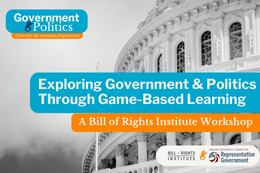 Rights Institute and the Center on Representative Government at Indiana University offers practical experiences for educators eager to infuse engagement and deep understanding into their Government & Politics curricula.
Rights Institute and the Center on Representative Government at Indiana University offers practical experiences for educators eager to infuse engagement and deep understanding into their Government & Politics curricula.
Workshop Dates & Locations
- September 17, 2025 | Indiana University, Bloomington, IN (8 AM–3 PM) Register Here
- September 25, 2025 | Griffith Jr./Sr. High School, Griffith, IN (8 AM–3 PM) Register Here
These workshops are open to educators and civic-minded practitioners—register now to secure your spot. Game-based learning isn’t just a buzzword — it’s a proven way to enhance learner motivation, critical thinking, and retention. Research increasingly points to the power of incorporating game mechanics—like goals, rules, feedback, and collaborative or competitive elements—into educational design to transform passive lessons into active civic exploration. By attending, participants will:
- Engage directly with strategic civic simulations—bridging theory and practice.
- Discover new pedagogical tools to elevate student engagement and analytical thinking.
- Explore immersive methods, both tabletop and digital, that resonate with diverse learners.
These experiences embody how civic education can be dynamic, participatory, and deeply rooted in democratic values. If you’re passionate about reimagining civics instruction, and ensuring that students not only learn about government but experience its challenges first hand—these workshops offer a rich and rare opportunity. By blending immersive gameplay with civic inquiry, educators can foster a classroom culture where participation is both taught and practiced.
CREATE Information
CREATE can support MCS teachers. If you have questions or to recommend additional Professional Development events, please email CREATE@bsu.edu.
To stay informed of the latest resources and opportunities, sign up for CREATE’s email list.
Visit the CREATE Website.
CREATE is grateful for the support of the U.S. Department of Education.

